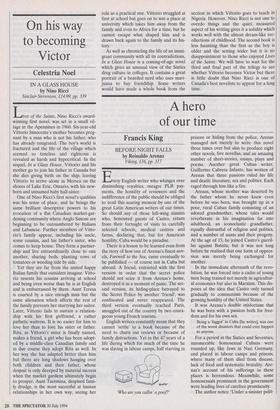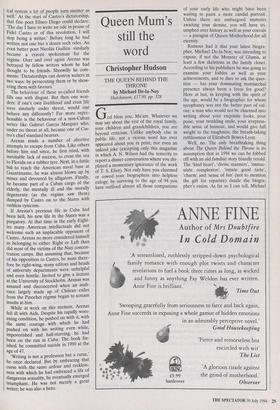A hero of our time
Francis King
BEFORE NIGHT FALLS by Reinaldo Arenas Viking, £16, pp. 317 Every English writer who whinges over diminishing royalties, meagre PLR pay- ments, the hostility of reviewers and the indifference of the public should be obliged to read this searing memoir .by one of the great Latin American writers of our times. So should any of those left-wing ninnies who, honoured guests of Castro, return from their fortnight of visits to carefully selected schools, medical centres and farms, declaring that, but for American hostility, Cuba would be a paradise.
There is a lesson to be learned even from the story of how one of Arenas's finest nov- els, Farewell to the Sea, came eventually to be published — of course not in Cuba but abroad. A friend, entrusted with the first version in order that the secret police should not seize it from Arenas's home, destroyed it in a moment of panic. The sec- ond version, its hiding-place betrayed to the Secret Police by another 'friend', was confiscated and never reappeared. The third version eventually reached Paris, smuggled out of the country by two coura- geous young French tourists.
English writers constantly moan that they cannot 'settle' to a book because of the need to churn out reviews or because of family distractions. Yet in the 47 years of a life during which for much of the time he was slaving in labour camps, half starving in `Who are you callin' a poof?' prisons or hiding from the police, Arenas managed not merely to write this novel three times over but also to produce eight other novels, five novellas, and an amazing number of short-stories, essays, plays and poems. Another great Cuban writer, Guillermo Cabrera Infante, has written of Arenas that three passions ruled his life and death: literature, sex and politics. Each raged through him like a fire.
Arenas, whose mother was deserted by the father whom he never knew even before he was born, was brought up in a poor, rural Cuban family consisting of an adored grandmother, whose tales would reverberate in his imagination far into adulthood, an iconoclastic grandfather, equally distrustful of religion and politics, and a number of aunts and their progeny. At the age of 15, he joined Castro's gueril- las against Batista; but it was not long before he realised that one form of oppres- sion was merely being exchanged for another.
In the immediate aftermath of the revo- lution, he was forced into a cadre of young men being trained not merely in agricultur- al economics but also in Marxism. This dis- poses of the idea that Castro only turned gradually to communism because of the growing hostility of the United States.
It was Arenas's double misfortune that he was born with a passion both for free- dom and for his own sex.
Being a 'faggot' in Cuba [he writes], was one of the worst disasters that could ever happen to anyone.
For a period in the Sixties and Seventies, innumerable homosexual Cubans were rounded up, like Jews in Nazi Germany, and placed in labour camps and prisons, where many of them died from disease, lack of food and systematic brutality. Are- nas's account of his sufferings in these places is horrendous. Meanwhile, some homosexuals prominent in the government were leading lives of carefree promiscuity.
The author notes: 'Under a sinister polit- ical system a lot of people turn sinister as well.' At the start of Castro's dictatorship, that fine poet Eliseo Diego could declare: The day I have to write an ode in praise of Fidel Castro or of this revolution, I will stop being a writer.' Before long he had written not one but a dozen such odes. An even better poet Nicolas Guilien similarly became a craven spokesman for the regime. Over and over again Arenas was betrayed by fellow writers whom he had thought to be friends. Shrewdly he com- ments: 'Dictatorships can destroy writers in two ways: by persecuting them or by show- ering them with favours.'
The behaviour of these so-called friends fills one with disgust. But then one won- ders: if one's own livelihood and even life were similarly under threat, would one behave any differently? Far more repre- hensible is the behaviour of a non-Cuban writer like Gabriel Garcia Marquez who, under no threat at all, became one of Cas- tro's chief standard bearers.
Arenas made a number of abortive attempts to escape from Cuba. Like others before him and since, he first tried, with inevitable lack of success, to cross the sea to Florida on a rubber tyre. Next, in a futile bid to reach the American naval base at Guantanamo, he was almost blown up by mines and devoured by alligators. Finally, he became part of a Cuban cargo of the elderly, the mentally ill and the morally degenerate (as the regime saw them) dumped by Castro on to the States with ruthless cynicism. If Arenas's previous life in Cuba had been hell, his new life in the States was a purgatory. At that time in the early Eight- ies many American intellectuals did not welcome such an implacable opponent of Castro. Arenas no more considered himself as belonging to either Right or Left than did most of the victims of the Nazi concen- tration camps. But assuming that, because of his opposition to Castro, he must there- fore be right-wing, many editors and heads of university departments were unhelpful and even hostile. Invited to give a lecture at the University of Stockholm, Arenas was amazed and disconcerted when an audi- ence largely made up of Chilean exiles from the Pinochet regime began to scream insults at him.
While at work on this memoir, Arenas fell ill with Aids. Despite his rapidly wors- ening condition, he pushed on with it, with the same courage with which he had pushed on with his writing even while, impoverished and half-starving, he had been on the run in Cuba. The book fin- ished, he committed suicide in 1990 at the age of 47. `Writing is not a profession but a curse,' he once declared. But by embracing that curse with the same ardour and reckless- ness with which he had embraced a life of dangerous sexuality, he eventually emerged triumphant. He was not merely a great writer; he was also a hero.



















































 Previous page
Previous page